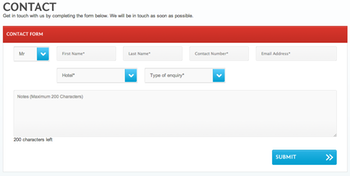 This week’s award for daft user interaction design goes to Rydges, the chain of hotels and resorts, for their incredibly silly website contact form.
This week’s award for daft user interaction design goes to Rydges, the chain of hotels and resorts, for their incredibly silly website contact form.
Web contact forms can sometimes be useful, I suppose, if a business receives a lot of standard enquiries, because they can capture the structured data and put it straight into the customer relationship management (CRM) system. But most of these forms just dump the form data into an unstructured email, and dump that into some poor soul’s inbox. Why not just publish an email address? Are your spam filters that shoddy?
But when contact forms have badly-worded multiple-choice options, ill-thought-out data validation code, or unworkably small data fields, they make things difficult for everyone — and this one’s got the lot.
According to Rydges, you must have a title, but it can only be “Mr”, “Mrs”, “Ms” or “Miss”, not “Dr” or “Rev” or anything else. Your name must consist of two words. Your phone number cannot start with the “+” that comes before the country code, odd for an international business, nor may it contain spaces. And the “Type of enquiry” drop-down has only two choices, “Business” or “General”.
Is a question about the hotel restaurant’s opening hours, for example, “Business” or “General”, I wonder?
But the pièce de résistance is that the body text is limited to just 200 characters. That’s about 30-odd words of standard English text. Good luck with that.

Hi Stilgherrian,
Thanks for your feedback, we truly appreciate any feedback regarding our new website. We’ve come a long way in the last year from our ancient website to our shiny new one and we’re always looking to improve it where we can.
I have taken your comments on board and have scoped in to have these changes made to our contact form in the near future.
Once again, your feedback is appreciated and I hope we soon you in the near future 🙂
Monique Clark
Web Design Manager
Rydges Hotels & Resorts
@Monique Clark: Thanks, I appreciate you getting back to me. Website contact forms are one of my more constant annoyances, and so few seem designed to ease communication rather than becoming a barrier.